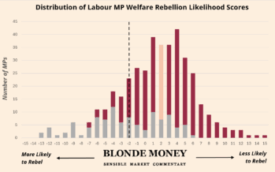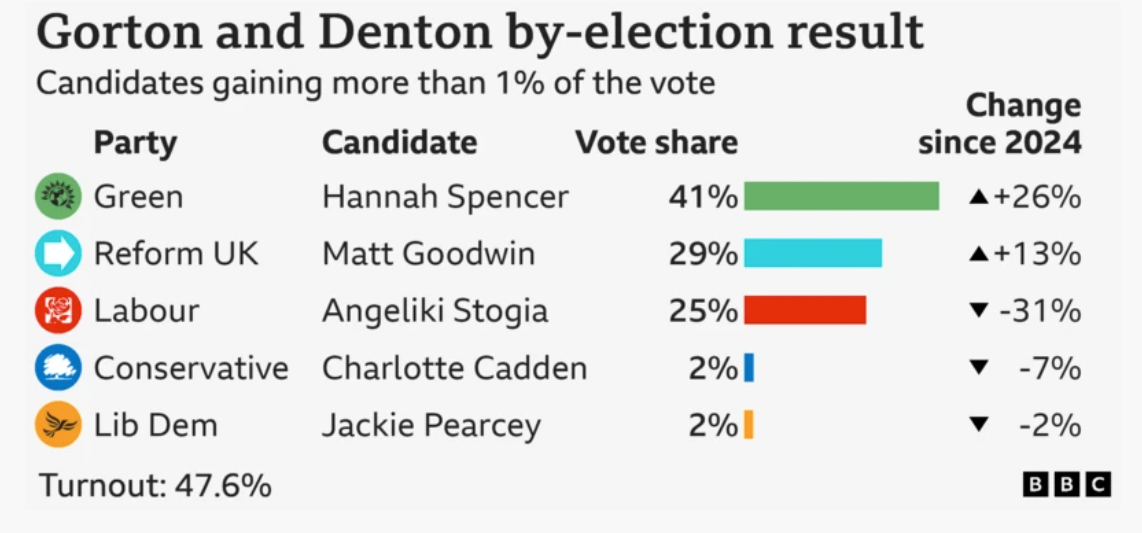
24th June 2025
Welfare Reform Bill Rebellion
- Our team calculated a score for each Labour MP on their likelihood of rebelling on the Welfare Reform Bill (due Tuesday 1 July).
- The score takes into account various quantitative criteria such as prior voting record, majority, impact on disability claimants in their constituency etc.
- All weightings are informed decisions based on suited correlation models, intuition, recency of relevant data, and trustworthiness of data.
- There are enough rebels to eliminate the Government’s majority, even taking into account abstentions.
- MPs with a negative score total 128.
- Recent information has confirmed our analysis:
- MPs putting their name to a reasoned amendment that would kill the bill have scores that go well beyond the point at which the majority is lost.
- A minister, Vicky Foxcroft, has already resigned over the issue.
- As a government whip this is a sign of how hard it has been to whip a broad group of unhappy MPs.
- The chart below shows the majority line, whereby the government loses its majority if all MPs to the left of it were to vote against:

- The spread of rebels beyond this line demonstrates the hill that the government must climb to pass the legislation:
- The grey bars represent MPs who signed the reasoned amendment.
- The pink bar includes Vicky Foxcroft.
- These are not the usual troublemakers.
- They are not ideologically homogenous.
- But they are all deeply unhappy with the bill as it stands.
- It would be very hard to tweak the bill.
- It has been set up this way precisely to yield the £5bn of savings required to help meet the fiscal rules.
- It would be hard to pull the bill.
- It has been designed as a money bill, such that it comes into force after one month, with or without the approval of the House of Lords
- This would enable the OBR to take it into account as it enters the forecast period ahead of the Budget
- Observance of OBR timings is why the winter fuel payment decision was taken last summer, as eligibility for the benefit is measured mid September.
- Setting in stone parameters for benefits enables the OBR to include the data in its model, rather than having to account for something promised in the future but not yet delivered.
- As a chess player, Reeves must know she is in zugzwang.
- If the bill fails, her job of meeting the fiscal rules gets harder.
- If she softens the bill to make it pass, her job of meeting the fiscal rules gets harder.
- Gilt markets are not yet ruffled, assuming shortfalls from the fiscal rules will be made up by tax rises and/or spending cuts in the Budget.
- This will not last. Markets will realise:
- If the government with a huge working majority of 165 cannot pass a bill to save £5bn, its political capacity to take even harder decisions is limited.
- Tax rises are no panacea as there becomes a point at which the tax burden has no more pips left to squeeze.
- This will not last. Markets will realise:
- If – when – the Gilt market charges a higher risk premium to account for this, the government’s task will become impossible and a fiscal crisis will ensue.
- The government is struggling to govern because it was elected with a majority but no mandate for its subsequent decisions.
- Clobbering pensioners, farmers and now the disabled is not what Labour MPs waited fourteen years to deliver.
- The inevitable tax rises will harm growth and ultimately lead to breaking manifesto pledges, irrevocably driving Labour voters elsewhere and forcing breaking point upon the Labour Party itself.
- There is precedent – the TIG Group was formed after seven Labour MPs resigned the whip in 2019 over Brexit.
- The government is sowing the seeds of its own demise by failing to deliver a credible plan for debt sustainability that can meet both of its self-imposed fiscal and political constraints.
++ With thanks to the BM Team for their painstaking modelling work, particularly project leader Tom Berey ++



